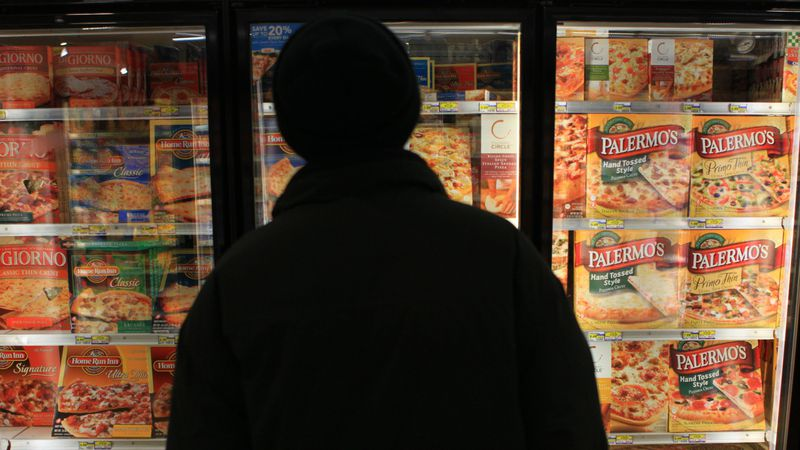A Drunkard's Defense Of Frozen Pizza
It's Saturday night—Sunday morning, almost. I've just left my neighborhood bar after a night out with friends (rarer than it used to be, but just as fun). I convince my husband to walk the long way home, past the 24-hour gas station. There I grab a plain cheese pizza from the picked-over freezer section.
Most days, I'd doctor it up. I'd sauté mushrooms with slivered garlic and oregano and chili flakes, toss fresh spinach into the pan at the last minute, grate a hint of nutmeg over everything. I'd agree with Bon Appétit's editor-in-chief Adam Rapoport when he says, "Okay, but yeah—if you're making frozen pizza, you can't NOT doctor it." But this isn't most days. This is a late, drunken night. I kick off my shoes, rip open the box, crank up the oven, and wait for the pizza to crisp up, unadorned.
Bon Appétit's "Five Chefs On How They'd Doctor Up Frozen Pizza" (the source of Rapoport's quote) is imaginative and practical. In just five entries, it overflows with appetizing out-of-the-box ideas to transform store-bought pizza, from pungent black salt to the sweet perfume of figs and honey. Most food writing is preoccupied with such experimentation, innovation, and invention; the best of it is a joyful celebration of curiosity and endless variety. When we do talk about "convenience" foods, it's assumed that we improve upon them. After all, what is there to say about cooking a frozen pizza straight out of the box? What except "Last call, who wants pizza?" (Answer: Everyone. After all, "Drunk is the best seasoning.") But in that enthusiasm for refinement, simple pleasures can get lost, and so can the complex reality of how and when we enjoy different foods.
There's nothing wrong with doctoring up a frozen pizza—or with writing about it. But when we announce, "Not that I like frozen pizza, of course," or suggest that only a chef's imprimatur can make frozen pizza "respectable to non-teenagers," or we employ the lazy, tired headline construction "We taste test frozen pizzas, so you don't have to," we snub not just the product, but its satisfied consumers. There's an underlying thesis there that food straight from the assembly line may be good enough for the mass market, but certainly not for us. The implicit idea that there's virtue in that transformation—not just an improvement of flavor or nutrition, but of character—is a smug, silent boundary between the aficionado and the rabble. It suggests that an unembellished frozen pizza (or a box of mac and cheese, or a serving of sag paneer in its microwave-safe tub) is fit only for the apathetic, the lazy, or the incapacitated.
But at some point, most of us will be apathetic or incapacitated. And even people who make a living thinking about food can sometimes crave the simplest, most immediate indulgence, and the luxury of not thinking about it.

I've made countless pizzas. I've invested in specialty flours and pans, achieved perfect windowpane, and had long conversations about hydration ratios. But when I come home sloshed and starving—or overworked, or worn out, or just plain lazy—I don't want to spend extra minutes gussying up prepared food or even placing an order for delivery. I want pizza, I want it fast, and I'm lucky enough to live in a world where I can have it.
As long as we don't look at it explicitly, it's hard to see the tacit conceit that improving a store-bought food—not to mention baking homemade bread, or appreciating molecular gastronomy, or any act of connoisseurship or skill—is a mark of refinement in taste and character alike. It's easy to ignore the corollary that eating a frozen pizza as-is betrays a lack of sophistication. Because the self-flattery is entirely unspoken, it's easy to swallow. Almost as easy as cooking a frozen pizza to its box's specifications.
When I have the flu, I don't want chicken soup from scratch. I want Campbell's Chicken Noodle Soup. That's what I remember from childhood sick days when Mom had five kids, jobs inside and outside the house, and no damn time to simmer homemade broth. (If I ask for Chicken & Stars, call a doctor, because I'm really sick.) I make spectacular pots aux chocolat, but when my husband brought home a refrigerated tub of pudding after my oral surgery, I ate the whole thing in a day. Just this month, I had my first-ever unadulterated box of mac-and-cheese. The next day, I had another.
Food is more than fuel, more than flavor. As Helen Rosner says, "Food means more than it used to—what we do with it means more." What we eat and how we eat it has always been a badge of identity. Our choices are expressions, not just of culture and class, but of personality. Like our identities, our needs and tastes are varied, layered, and dynamic. At different times, in different circumstances, we're all the aficionado, and we are all the rabble. Tonight, not quite tipping over as I toe my way out of my shoes and rip open the box, I am the drunkard—and to that drunkard, frozen pizza is perfection.
